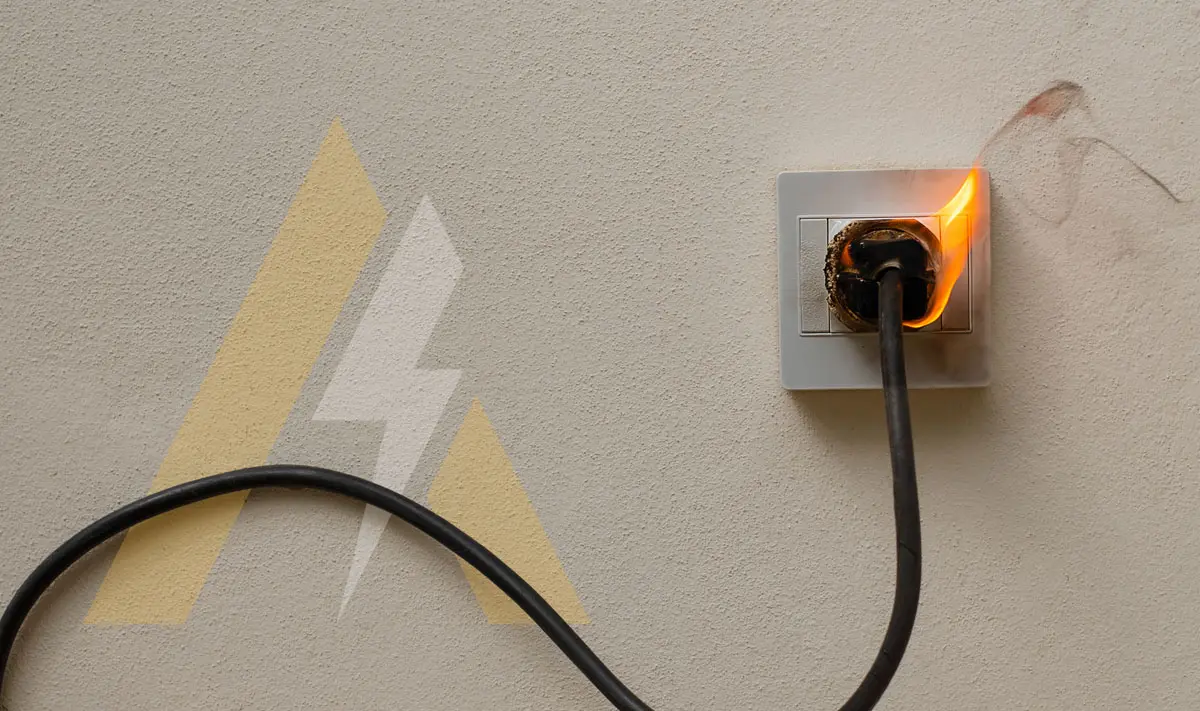Electricity powers nearly everything we use today, but we still face recurring electrical issues daily, even within our own homes. What are some of those common problems? Should you be concerned? Today, we’re going to take a look at 15 of the most common household electrical problems.
1. Flickering or Dimming Lights
It can feel like no matter what you try, the lights in your home are never perfect. Potential issues include:
- Varying brightness: This can be because the wattages are not the same across your home or your lighting has a faulty neutral line or connection.
- Sporadic flickering: Loose lightbulbs cause flickering lights, as does faulty wiring. Electrical wiring problems are dangerous and should be fixed as soon as possible. Before calling an electrician, ensure that the bulb is screwed in completely.
- Frequent burnout: Causes include a bad pack of bulbs, a wattage overload or faulty main circuit wiring.
If you experience these symptoms, check the lightbulbs and ensure that not too many appliances are running on the same circuit. If neither of these is the culprit, contact an electrician to help you find the problem.
2. Power Surges
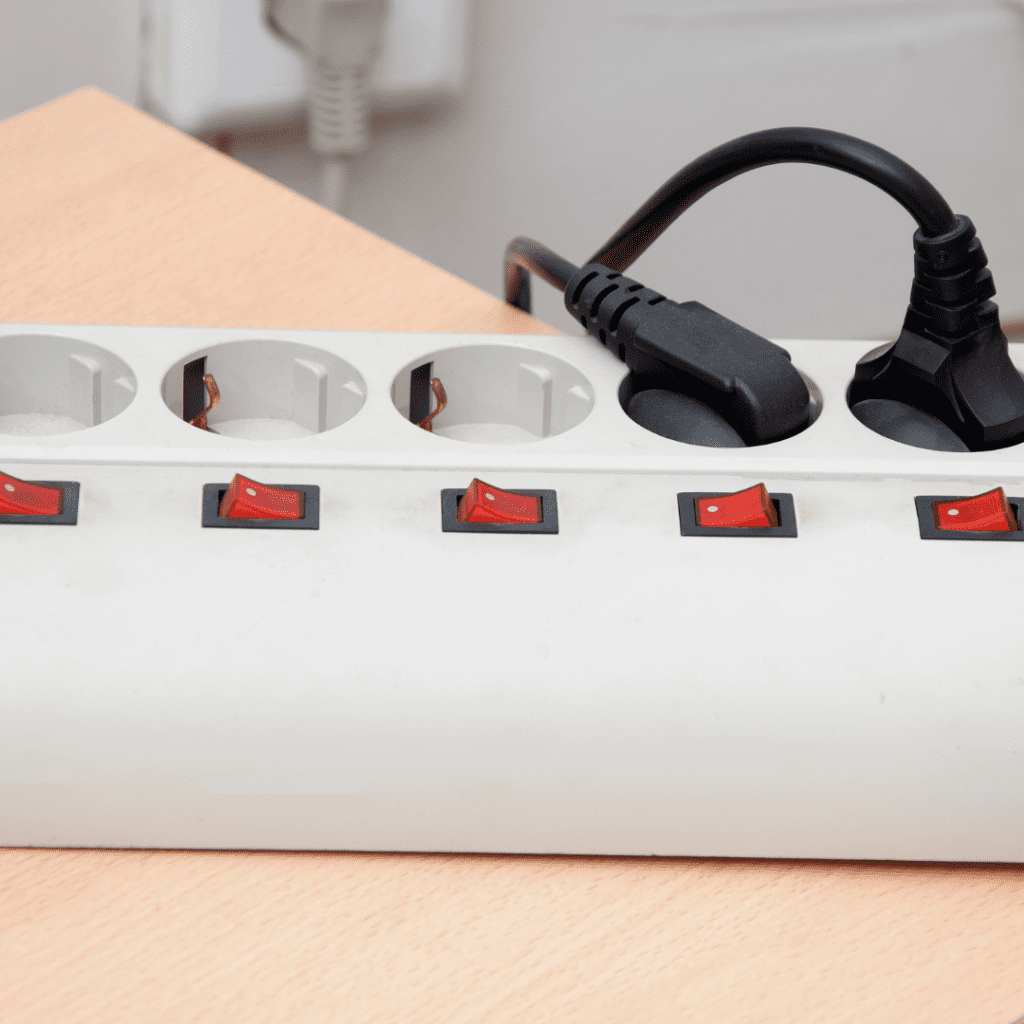
Many factors cause power surges, including:
- Winter storms
- Damaged power lines
- Problems at the power company
These surges can be incredibly annoying, as they cause your lights to go off or your TV to switch on and off quickly.
Lightning is often the culprit behind a power surge, but a surge may also result from:
- Cheap electronics
- Utility issues
- Faulty wiring
- Electrical overloads
To prevent surge damage, consider investing in surge protectors for individual appliances or whole-house surge protection for all your electronics.
3. Overloaded Circuits and Outlets
Overloaded outlets can be a concern if you have many electrical appliances, as most of us do. An outlet or circuit overloads when it sends out more current than it can handle. Signs of overload may include:
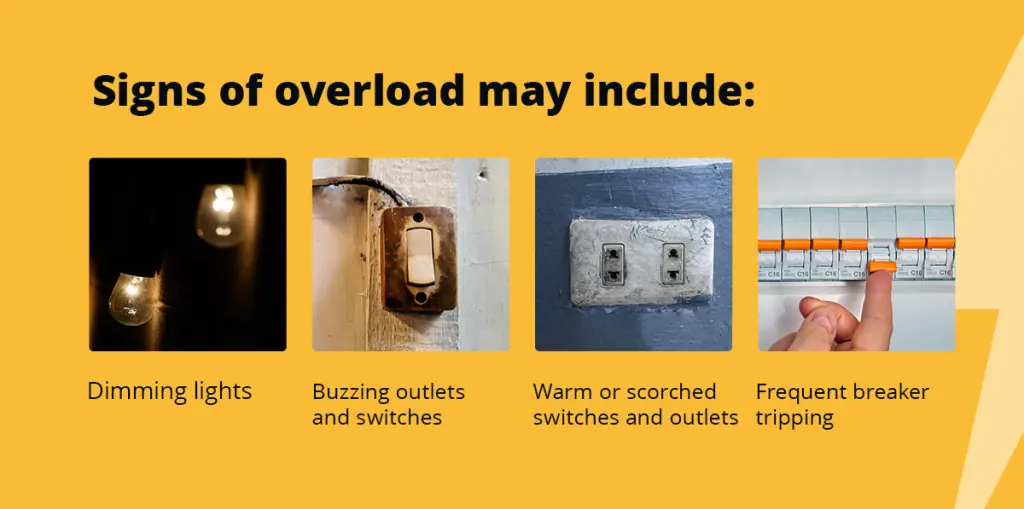
- Dimming lights
- Buzzing outlets and switches
- Warm or scorched switches and outlets
- Frequent breaker tripping
4. Circuit Breakers Tripping Frequently
While a tripping breaker could indicate a larger electrical problem, it also means the breaker is doing its job. Breakers may trip for several reasons, including:
- Power overload
- Short circuits
- Ground faults
Try using fewer appliances simultaneously and see if it helps. If your breaker is still tripping, consider calling an electrician.
5. Electrical Shocks
Today’s electrical codes are stricter than they once were, and it’s less common to get shocked in a newer home.
However, older homes with older electrical systems can be cause for concern. Poor insulation and non-grounded wiring are often the culprits in older homes.
If you get shocked when turning on an appliance, it may be the appliance itself. We suggest plugging another appliance into the same outlet. If you still receive a shock, it’s an issue with your wiring.
6. Hot Outlets or Switches
If your home’s sockets or switches are heating up with no obvious external cause, it could be a symptom of a major electrical fault.
Some of the most common causes include:
- Loose wiring
- Faulty wiring
- Electrical shorts
Outlets and switches should generally be at room temperature. If you discover this problem, contact a certified electrician immediately.
Do not attempt to repair this problem, as it could indicate damaged live wires within the socket.
While you wait for the electrician, turn off your home’s main breaker switch and ensure the affected socket is switched off before restoring power. Doing so helps avoid hazards like electrocution and electrical fire.
7. Dead or Non-Working Outlets
Dead outlets are a common electrical problem in old homes, generally resulting from:
- Loose wiring
- Disconnected circuits
- Tripped breakers
- Tripped ground fault circuit interrupters (GFCIs)
If you find this problem:
- Check your breaker box for tripped switches.
- If it’s a GFCI power socket, check that it hasn’t tripped.
- If neither of these is the cause, call an electrician.
A socket can also be burnt out and require replacement. If a wire has come loose inside the socket, it may still be live. Loose wires and disconnected circuits both require an electrician for safe repair.
8. Sags and Dips in Power
A power dip or sag occurs when there is a brief drop in voltage. The power will not go out completely, but your lights may dim for a second. These can occur when you have faulty small appliances plugged in — don’t get electronics at a flea market. Running numerous power-heavy appliances can also cause dips or sagging.
It’s worth noting that there are different kinds of power dips:
Persistent dips: Last for over a minute and potentially continue for hours. May be caused by equipment failure, overloaded circuits or damage to the incoming power lines
Momentary dips: Last for less than a minute and may be caused by any range of local events, including starting an energy-heavy appliance

If you’re trying to discover the cause of your power dips, momentary or persistent, it’s best to bring in an electrician. They can narrow down the potential causes and suggest the best solutions.
9. High Electrical Bills
No one wants to see high electrical bills. Paying $$$ on your electrical bill every month is not fun, but what may be causing it? To solve the issue, look for and remedy the following electrical problems in your house:
- Electrical surges: Identify and eliminate any devices that may be causing electrical surges.
- Provider problems: If your electrical provider is a problem, switch to a more efficient one if that’s an option in your area.
- Circuit overload: Unplug unused electrical devices since they still draw some electricity.
- Defective wiring: Find and repair or replace any faulty wiring.
- Outdated circuitry: In some cases, old wiring and electrical panels can cause higher consumption.
- Phantom loads: Some appliances, like televisions and phone chargers, draw electricity when plugged in (even when switched off), and can cause significant power consumption.
- Inefficient appliances: Appliances have energy ratings, with some models being more energy-efficient than others. If you have many appliances that aren’t Energy Star certified, they can consume a lot of energy.
If you think you may have energy vampires for appliances, consider investing in smart monitoring plugs. These tools measure the power consumption of anything plugged into them. Some also have timers or cutoff settings, allowing you to prevent excessive consumption by any one device.
10. Outdated Wiring
Older electrical systems have often seen extensive wear. When renovating, extending or selling a home, you may need to replace some wiring. Otherwise, you’ll only need to upgrade wires when you experience symptoms like:
- Frequent breaker tripping
- Flickering lights
- Scorch marks around outlets
Some old homes contain systems like knob and tube wiring, consisting of ceramic knobs and porcelain tubes. In this case, you need to upgrade the wiring, as it poses a significant safety risk.
11. Buzzing Sounds From Outlets or Switches
Buzzing electrical sockets or switches are a common sign of household electrical issues, like:
- Loose wiring
- Malfunctioning devices
- Faulty appliances
Sometimes, buzzing is normal — transformers in certain devices (like doorbells) may buzz due to the imperfect change between two voltages. Dimmer switches also buzz sometimes.
However, a buzzing control panel, switch or socket is concerning. If the sound is coming from a specific appliance, unplug it and see if the buzzing continues. If it persists, contact an electrician for an electrical inspection.
12. Overcircuited Electrical Panel
Your household electrical panel was designed to accommodate a certain number of electrical circuits. You should be able to identify this number by opening your panel and seeing the number of switches.
Having too many things connected to your electrical panel is a hazardous code violation. If you’re concerned this may be a problem, you should have an expert check everything.
If you suspect it’s time to upgrade your home’s electrical panel, look for the following signs:
- Frequently tripping breakers
- Flickering llights
- Malfunctioning outlets
- Recurring outages
- Constantly resetting breakers
- Inefficient appliances
- Slow device charging
- Warm or hot panel or breakers
If you see any of these signs, it’s important to have an expert check your system. Modern appliances and lifestyles require more energy than most homes needed in the past, making appropriate panel sizing essential.
13. Malfunctioning Light Switches
When light switches don’t turn lights on all the way or at all, it’s often a sign that the electrical work in your home wasn’t done properly. It can also mean that the equipment and products used aren’t of the best quality. If you’re in a new home and a switch doesn’t do anything, it may be that it’s not connected or the device has been removed.
Generally, faulty light switches give problems due to one of a few reasons, including:
- Loose wires
- Wear and tear
- Loosened toggles
All of these are generally the result of a loose inner mechanism. Except in the case of loose wires, these causes all demand a new switch.
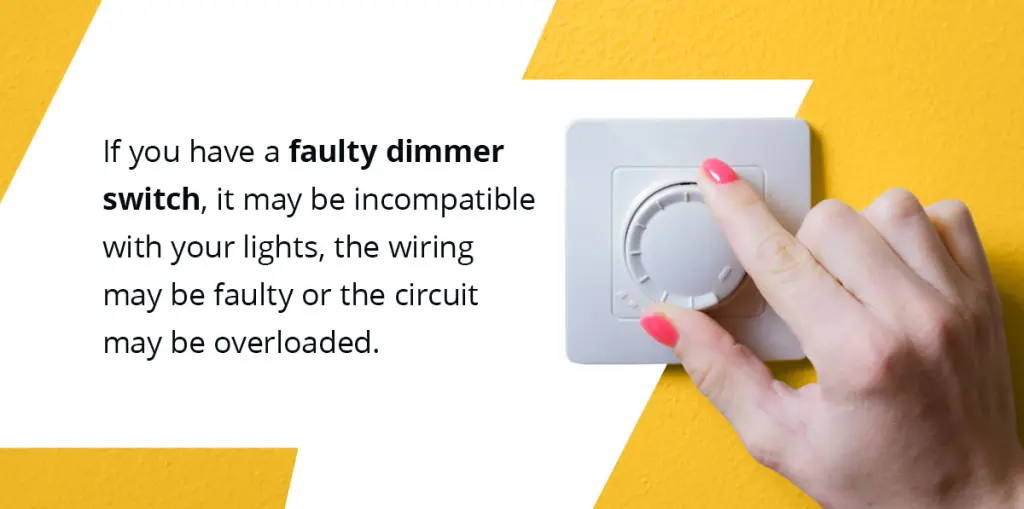
If you have a faulty dimmer switch, it may be incompatible with your lights, the wiring may be faulty or the circuit may be overloaded. Most smart switch issues, on the other hand, originate with connectivity problems or light bulb incompatibility.
If you have concerns about your light switches and what’s causing the problem, call Asbury Electric.
14. Exposed Wiring or Junction Boxes
Junction boxes in older homes sometimes lack covers. Since they house essential and potentially dangerous wires, they should have a cover to keep you safe in the event of frayed or damaged wires.
While exposed wires aren’t necessarily dangerous, they generally are when connected to your home’s electricity grid. Other types of wire to look out for include:
- Discolored, rusty or burnt wires
- Obviously damaged cables
- Unsecured wires
Any of these could be a symptom of a more severe problem and a cause for concern. Either way, having an open wire or junction box that leaves live wiring exposed is a potentially fatal problem. Not having a cover is also a code violation according to OSHA.
If you see any exposed wiring, it is generally best to contact an electrician. They can determine which circuits to deactivate so they can safely replace the wires. They’ll also know where to source a new junction box cover.
15. GFCI Outlet Issues
Water and electricity don’t mix, which is why GFCI sockets are essential and required by law in these locations:
- Kitchen receptacles
- Areas with sinks
- Food and beverage preparation areas
- Within 20 feet of a pool
- Accessory buildings, garages and boathouses
Some of these requirements have caveats. For a detailed overview, read the 2023 NEC changes.
If a GFCI experiences consistent problems, it indicates an underlying issue, like:
- Damaged cables or wires
- Moisture in the socket or circuit
- Faulty appliances
- Melted electrical terminals
- Overloaded circuits
If your sockets don’t reset after tripping, check the wall switch related to the GFCI — it has an indicator for faults detected. If that’s the case, have an electrician test the system. They can find the root cause and issue a quote for repair.
Prevention and Safety Tips
It’s possible to minimize the risk of some common household electrical problems by doing regular inspections to look for:
- Loose or damaged switches, sockets and plugs
- Scorched sockets and burning electrical smells
- Buzzing or hot electrical outlets
If you find any of these, call an electrician — especially when they may indicate more significant problems. While doing these inspections, wear insulated gloves to ensure you don’t get shocked. If in doubt, leave it to the professionals.
When to Call a Professional
With common household electrical problems, you can handle many small aspects yourself, including:
- Basic inspections of extension leads, light switches, plugs and appliances
- Tightening screws that come loose on light switches and plugs
- Appliance maintenance, like cleaning out the dryer lint
Before deciding you can do something, ask yourself:
- Can I do this without working with live electricity?
- Do I know how to complete the task safely and to code?
- Am I trained to complete this repair?
If the answer to any of these questions is “no,” contact an electrician.
Finding the Right Electrician
Before hiring an electrician to work on your home, ask about their:
- Experience: Ensure the electrician has the experience needed to handle the job.
- Certification: Only allow certified electricians to work on your home’s electrical system.
- Insurance: Never allow an uninsured electrician to do work for you.
- Pricing: Ensure you understand whether they charge per hour or per job.
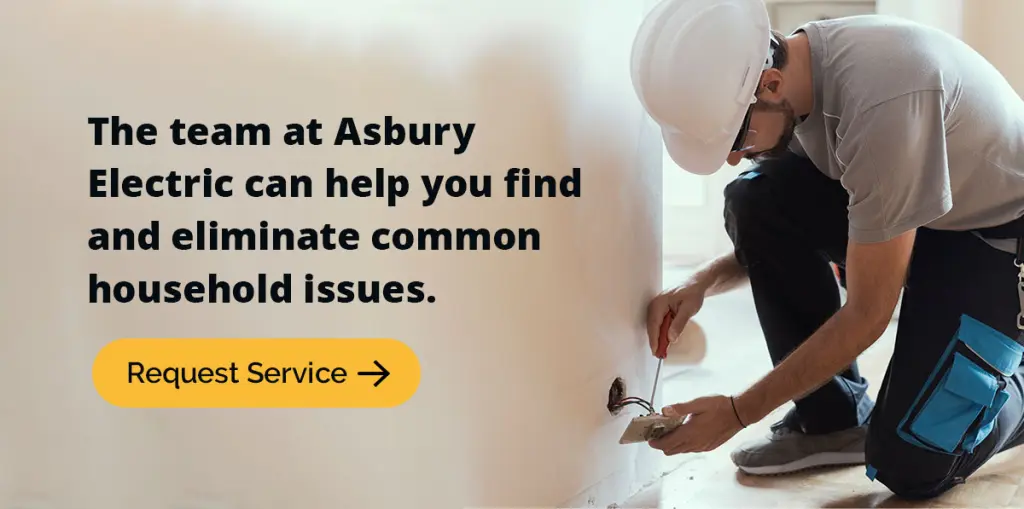
If you suspect you have any common electrical problems, get them checked as quickly as possible. The team at Asbury Electric can help you find and eliminate common household issues. Request a service today to arrange a complete electrical inspection.
